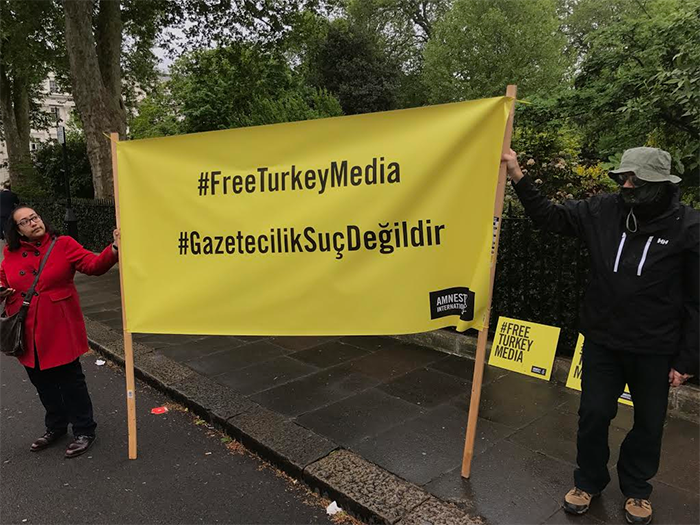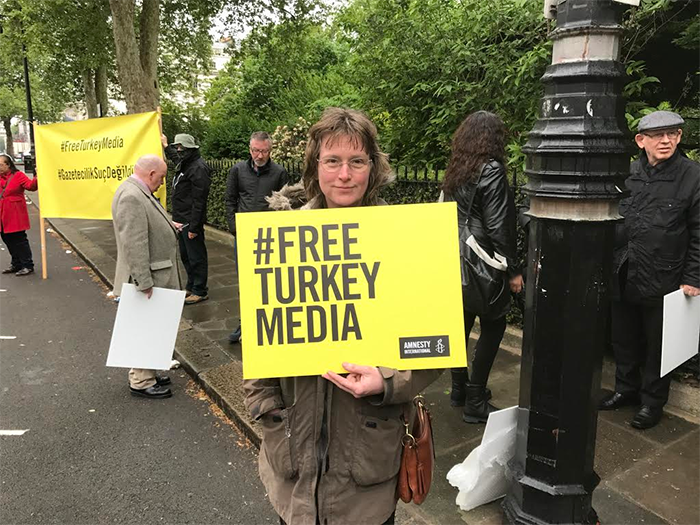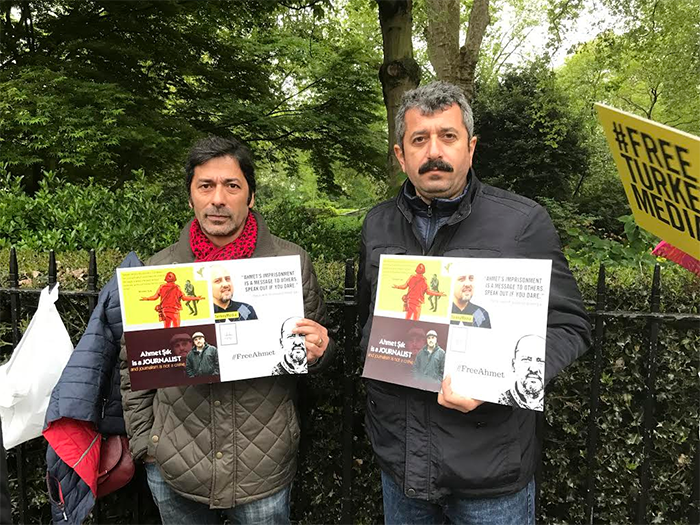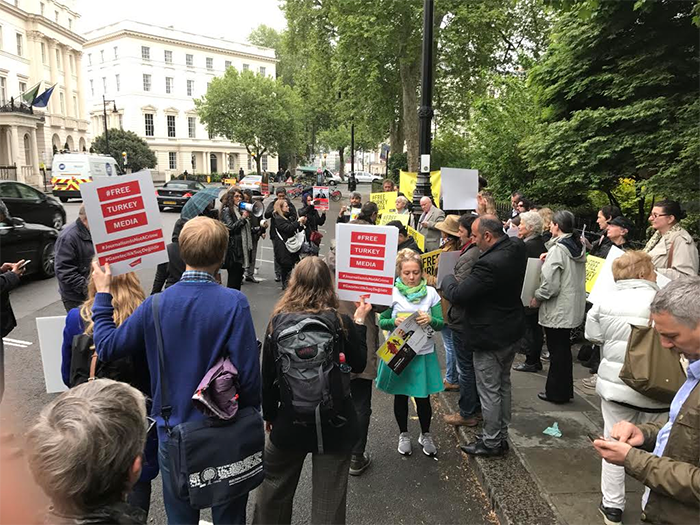Index relies entirely on the support of donors and readers to do its work.
Help us keep amplifying censored voices today.

Each youth advisory board sits for six months, has the chance to participate in monthly video conferencing discussions about current freedom of expression issues from around the world and the opportunity to write blog posts on Index’s website.
The next youth board is currently being recruited. The next youth advisory board will sit from January to June 2018.
We are looking for enthusiastic young people, aged between 16-25, who must be committed to taking part in monthly meetings, which are held online with fellow participants. Applicants can be based anywhere in the world. We are looking for people who are communicative and who will be in regular touch with Index.
Applications include:
Applications can be submitted to Danyaal Yasin at [email protected]. The deadline for applications is 10 January at 11:59pm GMT.
What is the youth advisory board?
The youth board is a specially selected group of young people aged 16-25 who will advise and inform Index on Censorship’s work, support our ambition to fight for free expression around the world and ensure our engagement with issues with tomorrow’s leaders.
Why does Index have a youth board?
Index on Censorship is committed to fighting censorship not only now, but also in future generations, and we want to ensure that the realities and challenges experienced by young people in today’s world are properly reflected in our work.
Index is also aware that there are many who would like to commit some or all of their professional lives to fighting for human rights and the youth board is our way of supporting the broadest range of young people to develop their voice, find paths to freely expressing it and potential future employment in the human rights, media and arts sectors.
What does the youth board do?
Board members meet once a month via Zoom to discuss the most pressing freedom of expression issues. During the meeting members will be given a monthly task to complete. There are also opportunities to get involved with events such as debates and workshops for our work with young people as well as our annual Freedom of Expression Awards and Index magazine launches.
How do people get on the youth board?
Each youth board will sit for a six-month term. Current board members are invited to reapply up to one time. The board will be selected by Index on Censorship in an open and transparent manner and in accordance with our commitment to promoting diversity. We usually recruit for board members during May and December each year. Follow @IndexCensorship on Twitter or subscribe to our Facebook feed to watch for the announcements.
Why join the Index on Censorship youth advisory board?
You will be associated with a media and human rights organisation and have the opportunity to discuss issues you feel strongly about with Index and peers from around the world. At each board meeting, we will also give you the chance to speak to someone senior within Index or the media/human rights/arts sectors, helping you to develop your knowledge and extend your personal networks. You’ll also be featured on our website.
[vc_row][vc_column][vc_single_image image=”90233″ img_size=”full” alignment=”center”][vc_column_text]About Positive Hell
Positive Hell is a 30-minute documentary that tells the stories of five Spanish people, living in northern Spain, who tested positive for HIV in the late 80s who, defying the overwhelming medical consensus, chose not to take medication, or took it for a short period of time and then stopped. Although one of the protagonists dies before the film is finished, he had lived for 27 years without HIV medication, and his testimony alongside the others maintains that their decision was life-enhancing and not life-threatening. The premise of the film is that the widely-accepted scientific approach to prognosis, diagnosis and treatment is wrong and that the drug companies “are the only beneficiaries” to the current approach to AIDS treatment.
The film – written and narrated by Joan Shenton of Meditel Productions was co-produced with the film’s director Andi Reiss of Yellow Entertainment – has been screened at many festivals around the world and was nominated for best film at the Marbella Film Festival.
In 2016, two planned London screenings of the film were pulled – by the London Independent Film Festival (LIFF) and the Portobello Film Festival (PFF). A third screening was pulled by Bluestockings Bookstore in New York and so outside the UK scope of Index on Censorship’s Art and Offence programme. In all three cases, cancellation of the planned screening came following public pressure and pressure from campaigning groups and science professionals.
The cancellations
The two cancellations in London followed a similar pattern: the film was accepted, programmed and advertised as part of a forthcoming festival programme. Within days of going public, the directors of the film festivals received letters from leading AIDS charities asking the film be pulled. The directors of the film festivals then wrote to the producers of the film, informing them that the film would no longer be part of the festival.
Positive Hell was due to be screened at London Independent Film Festival on 17 April 2016 and was cancelled the previous week. Portobello Film Festival was due to be screened on 12 September 2016 and was cancelled on 8 September.
Shenton contacted Index following the second cancellation of the film, to see if Index could help find out further information about why the films were pulled from the festivals. Index suggested that a Freedom of Information request could be made to Kensington Council, which was one of the funders of the Portobello Film Festival. The response to the FOI request outlined the reasons for cancelling the film, which the director had already conveyed in previous emails to Shenton and which are outlined below.
In researching this case study, Index wrote to the National Aids Trust and Terrence Higgins Trust, the two charities named in correspondence with LIFF (see below), asking them for access to the letters they sent to the festival directors. Index received, by return, a copy of the letter sent to Erich Schultz, director of LIFF, by Deborah Gold, Chief Executive of National Aids Trust.
Gold wrote: “The film proposes that the origin and nature of HIV and AIDS are up for debate and that is simply not true. There is 30 years of worldwide, respected research showing exactly how HIV works in the body and how it is contracted – as well as irrefutable evidence that without medication it will lead to AIDS. …Denying this basic truth about HIV and AIDS kills people.“
She ends: “Giving a platform to people who spread these abhorrent and dangerous views is incredibly irresponsible. I urge you to withdraw the screening of this film as a matter of urgency.“
The Terence Higgins Trust did not reply.
Case study continues below[/vc_column_text][/vc_column][/vc_row][vc_row el_class=”text_white” css=”.vc_custom_1493909985972{background-image: url(https://www.indexoncensorship.org/wp-content/uploads/2016/10/art-and-the-law-1460×490-2.jpg?id=80212) !important;background-position: center !important;background-repeat: no-repeat !important;background-size: cover !important;}”][vc_column][vc_column_text]
[/vc_column_text][/vc_column][/vc_row][vc_row][vc_column][vc_column_text]Index also wrote to both festival directors inviting them to discuss their reasons for pulling the film. Eric Schultz, director of LIFF did not reply. However, Shenton shared email correspondence in which Schultz indicated “two more major HIV/AIDS organisations” had contacted him urging him not to screen the film and “warning of protests to LIFF, the screening venue and the festival’s sponsors” if they failed to comply. Schultz said he had also received over twenty protest letters, including one from a LGBT society at the university where Schultz teaches and where the festival’s student advisory board is based.
The decision by Portobello Film festival to screen the film was condemned in an article by Buzzfeed LGBT editor Patrick Strudwick published on September 7, a day before the cancellation of the film was announced.
The Buzzfeed article brought together a range of voices that support the medical consensus on HIV and AIDS. In the article, Jonathan Barnett – director of the Portobello Film Festival – is quoted as saying: “We believe passionately in freedom of speech and expression, but clearly have no desire to create any distress. However in the spirit of not causing upset and as a people’s festival that is responsive to feedback from the public we have decided to pull the film.”
In reply to our approach, Barnett provided Index with a brief summary about the cancellation by email.
“The Festival has been going for 21 years. We are a free festival. We do not charge for film selection or submission, or entry to any of our events. We pulled the film due to concerns expressed to us and articulated in the attached Buzzfeed article. We invited Ms Shenton to the Festival where she gave a speech and distributed flyers… I hope we were responsible in not screening the film in case of the possible distress it could cause to Aids sufferers. Both Terrance Higgins and NAT, who might fairly be regarded as experts in this field, regard the film as unhelpful.”
Barnett told Index he was unaware of the controversial nature of the film when it was originally chosen for the festival. He stressed that although the festival decided to drop the film he did offer Shenton a chance to speak publicly about it, which she took up.
Barnett said the festival listened to the concerns of AIDS charities. “It is the view of AIDS charities and doctors that HIV/AIDS denial is a movement which has real and deadly repercussions for people living with HIV who then believe that they can stop anti-retrovirals and survive,” he told Index via email. “This also leads to ongoing transmissions fuelling the epidemic. There is overwhelming evidence, in the UK and worldwide, of tragedy that HIV/AIDS denial costs. When this was pointed out to us we pulled the film. No action, protest or otherwise, was threatened.”
Other opposition to the film
In February 2015, the filmmakers privately hired the London Frontline Club (FLC) for an invite-only launch of the film and the self-publishing of an updated copy of Shenton’s book Positively False. Although the Frontline Club was criticised for hosting the screening at their premises in Paddington, London, it went ahead without incident.
On this occasion, the pressure to cancel the event came from science writers Simon Singh and Ben Goldacre. Singh tweeted: “Is FLC smart enough to admit error + cancel? RT @bengoldacre: Shame on you @frontlineclub promoting AID denialism. https://www.pressdispensary.co.uk/releases/c993891/preview.html …”.
Index wrote to Singh asking him why, at the time, he thought that Frontline Club should cancel the film. He gave a detailed response, concluding:
“Clearly, it is not up to me to ban films, and nor would I want such power, but instead I was merely offering information and stressing that I thought they were doing the wrong thing by hosting the film. As a journalist, I think that I was making it clear that my opinion of the Frontline Club would fall if they were to go ahead with a policy of, essentially, taking money to screen any film regardless of the quality or accuracy. And I think many other science and health journalists would have felt the same.”
Shenton argues that by cancelling the film screenings, the five protagonists have been denied their voice and their experience has been invalidated.
“The film describes the agonies of being labelled as ‘HIV positive’ and poses these questions: just how reliable are the regular tests and diagnoses for HIV and how essential is it for everyone found HIV-positive to submit unquestioningly to a possible lifetime regime of antiretroviral drugs. The film’s protagonists made their own decisions not to take the HIV treatments offered and have lived healthy lives for almost three decades.”
A screening of the film was also cancelled at a bookstore in New York in 2016 although the film has been screened at other festivals, including the Queen’s World Film Festival in New York in March 2017 where it was awarded a special jury prize.
For more information about the issues and guidance for screening, displaying and mounting of controversial work and freedom of expression, please see our Art and Offence guidelines.[/vc_column_text][/vc_column][/vc_row][vc_row][vc_column][vc_basic_grid post_type=”post” max_items=”12″ style=”load-more” items_per_page=”4″ element_width=”6″ grid_id=”vc_gid:1494248689291-0c39a0ce-fa9d-5″ taxonomies=”8883″][/vc_column][/vc_row]
[vc_row][vc_column][vc_column_text]
On 3 May, World Press Freedom Day, dozens of activists and journalists gathered outside the Turkish Embassy in London to protest the arrest and imprisonment of journalists in Turkey. Index on Censorship joined Amnesty International, English Pen, Article 19 and others bearing signs and messages of hope.
Following the failed military coup in July of 2016, the Turkish government has unleashed a massive crackdown on its opposition, specifically targeting journalists, media outlets and educators.
Since then, over 150 journalists have been detained and over 170 media outlets have been shut down, resulting in an additional 2,500 journalists being out of work. Turkey is now the number one jailer of journalists in the world.
Seamus Dooley, the acting general secretary of the Nation Union of Journalists, addressed the protest, which took place across the street from the embassy: “We may be on the wrong side of the road but we are on the right side of history.”
Dooley highlighted the importance of coming out to protest in support of Turkey’s journalists, regardless of the weather: “Solidarity is the most important thing we can give them. Although this may seem like a dark time, the fact we are still with them shines a light on it.”
Many protesters stressed the importance of continuing to campaign until those being silenced in Turkey are free.

Ulrike Schmidt, Amnesty International
Ulrike Schmidt of Amnesty International said: “As a human rights organisation it’s our job to speak out. It’s World Press Freedom Day so we’re standing here to support the journalists in Turkey. We will keep campaigning until they can do their work again.”
Others spoke out specifically about friends who had been detained as a result of the crackdown. Two of the protesters (pictured below) came specifically to highlight the case of Ahmet Sik, a journalist with the Turkish opposition newspaper Cumhuriyet, who is currently being tried on accusations of spreading terrorist propaganda as well as insulting the state.

 [/vc_column_text][vc_column_text]
[/vc_column_text][vc_column_text]

[/vc_column_text][/vc_column][/vc_row][vc_row][vc_column][vc_basic_grid post_type=”post” max_items=”4″ element_width=”6″ grid_id=”vc_gid:1493899892143-33f1af52-13d4-5″ taxonomies=”8607″][/vc_column][/vc_row]
1.1 We are committed to safeguarding the privacy of visitors to www.indexoncensorship.org; we strive to minimise the amount of information we collect or allow to be collected by third parties on our website; in this policy, we explain how we will treat your personal information.
1.2 We will ask you to consent to our use of cookies in accordance with the terms of this policy when you first visit our website. By using our website and agreeing to this policy, you consent to our use of cookies in accordance with the terms of this policy.
2.1 Where possible we minimise the amount of information we collect by contracting with third parties. For example, event ticketing through Eventbrite (Privacy Policy) or donations processing through PayPal (Privacy Policy)
2.2 We may collect, store and use the following kinds of personal information:
(a) information about your computer and about your visits to and use of this website including your IP address, geographical location, browser type and version, operating system, referral source, length of visit, page views and website navigation paths
(b) Information that you provide to us for the purpose of subscribing to our email notifications and/or newsletter including your name and email address
(f) Information contained in or relating to any communication that you send to us or send through our website including the communication content and metadata associated with the communication
(g) Any other personal information that you choose to send to us; and provide details of other personal information collected.
2.3 Before you disclose to us the personal information of another person, you must obtain that person’s consent to both the disclosure and the processing of that personal information in accordance with this policy.
3.1 Personal information submitted to us through our website will be used for the purposes specified in this policy. Your information will not be published without your explicit permission.
3.2 We may use your personal information to:
(a) Administer our website and business
(b) Enable your use of the services available on our website
(c) Send you email notifications that you have specifically requested
(d) Send you our email newsletter, if you have requested it; You can inform us at any time if you no longer want to receive the newsletter
(e) Send you marketing communications relating to our business, where you have specifically agreed to this, by email, text or similar technology you can inform us at any time if you no longer require marketing communications
(f) Deal with enquiries and complaints made by you relating to our website
(g) Keep our website secure and prevent fraud
(h) Other uses
3.3 If you submit personal information for publication on our website, we will publish and otherwise use that information in accordance with the licence you grant to us.
3.5 We will not supply your personal information to any third party for the purpose of their or any other third party’s direct marketing.
4.1 We may disclose your personal information to any of our employees, officers, insurers, professional advisers, agents, suppliers or subcontractors insofar as reasonably necessary for the purposes set out in this policy.
4.3 We may disclose your personal information:
(a) To the extent that we are required to do so by law;
4.4 Except as provided in this policy, we will not provide your personal information to third parties.
5.1 Information that we collect may be stored and processed in and transferred between any of the countries in which we operate in order to enable us to use the information in accordance with this policy.
5.2 Information that we collect may be transferred to the following countries which do not have data protection laws equivalent to those in force in the European Economic Area: the United States of America
5.3 Personal information that you publish on our website or submit for publication on our website may be available, via the internet, around the world. We cannot prevent the use or misuse of such information by others.
5.4 You expressly agree to the transfers of personal information described in this Section 5.
6.1 This Section 6 sets out our data retention policies and procedure, which are designed to help ensure that we comply with our legal obligations in relation to the retention and deletion of personal information.
6.2 Personal information that we process for any purpose or purposes shall not be kept for longer than is necessary for that purpose or those purposes.
6.3 Notwithstanding the other provisions of this Section 6, we will retain documents (including electronic documents) containing personal data:
(a) To the extent that we are required to do so by law;
(b) If we believe that the documents may be relevant to any ongoing or prospective legal proceedings; and
(c) In order to establish, exercise or defend our legal rights (including providing information to others for the purposes of fraud prevention and reducing credit risk).
7.1 We will take reasonable technical and organisational precautions to prevent the loss, misuse or alteration of your personal information.
7.2 We will store all the personal information you provide on our secure password- and firewall-protected servers.
7.3 All electronic financial transactions entered into through our website will be protected by encryption technology.
7.4 You acknowledge that the transmission of information over the internet is inherently insecure, and we cannot guarantee the security of data sent over the internet.
8.1 We may update this policy from time to time by publishing a new version on our website.
8.2 You should check this page occasionally to ensure you are happy with any changes to this policy.
8.3 We may notify you of changes to this policy by email
9.1 You may instruct us to provide you with any personal information we hold about you; provision of such information will be subject to:
(a) The supply of appropriate evidence of your identity for this purpose, we will usually accept a photocopy of your passport certified by a solicitor or bank plus an original copy of a utility bill showing your current address.
9.2 We may withhold personal information that you request to the extent permitted by law.
9.3 You may instruct us at any time not to process your personal information for marketing purposes.
9.4 In practice, you will usually either expressly agree in advance to our use of your personal information for marketing purposes, or we will provide you with an opportunity to opt out of the use of your personal information for marketing purposes.
10.1 Our website includes hyperlinks to, and details of, third party websites.
10.2 We have no control over, and are not responsible for, the privacy policies and practices of third parties.
11.1 Please let us know if the personal information that we hold about you needs to be corrected or updated.
12.1 A cookie is a file containing an identifier a string of letters and numbers that is sent by a web server to a web browser and is stored by the browser. The identifier is then sent back to the server each time the browser requests a page from the server.
12.2 Cookies may be either “persistent” cookies or “session” cookies: a persistent cookie will be stored by a web browser and will remain valid until its set expiry date, unless deleted by the user before the expiry date; a session cookie, on the other hand, will expire at the end of the user session, when the web browser is closed.
12.3 Cookies do not typically contain any information that personally identifies a user, but personal information that we store about you may be linked to the information stored in and obtained from cookies.
12.4 Cookies can be used by web servers to identify and track users as they navigate different pages on a website and identify users returning to a website.
13.1 We use both session and persistent cookies on our website.
13.2 The names of the cookies that we use on our website, and the purposes for which they are used, are set out below:
(a) We use cookies on our website to recognise a computer when a user visits the website, track users as they navigate the website, improve the website’s usability, analyse the use of the website, administer the website, prevent fraud and improve the security of the website.
(b) Third parties may track users on our website when they interact with specific site functions such as social media sharing buttons or embedded video.
14.1 We use Google Analytics to analyse the use of our website.
14.2 Our analytics service provider generates statistical and other information about website use by means of cookies.
14.3 The information generated relating to our website is used to create reports about the use of our website.
14.5 Our analytics service provider’s privacy policy is available at: http://www.google.com/policies/privacy.
16.1 Most browsers allow you to refuse to accept cookies; for example:
(a) in Internet Explorer you can block cookies using the cookie handling override settings available by clicking “Tools”, “Internet Options”, “Privacy” and then “Advanced”;
(b) in Firefox you can block all cookies by clicking “Tools”, “Options”, “Privacy”, selecting “Use custom settings for history” from the dropdown menu, and unticking “Accept cookies from sites”; and
(c) in Chrome, you can block all cookies by accessing the “Customise and control” menu, and clicking “Settings”, “Show advanced settings” and “Content settings”, and then selecting “Block sites from setting any data” under the “Cookies” heading.
16.2 Blocking all cookies will have a negative impact upon the usability of many websites.
16.3 If you block cookies, you will not be able to use all the features on our website.
17.1 You can delete cookies already stored on your computer; for example:
(a) In Internet Explorer, you must manually delete cookie files you can find instructions for doing so at http://windows.microsoft.com/engb/internet-explorer/delete-manage-cookies#ie=ie-11;
(b) in Firefox you can delete cookies by clicking “Tools”, “Options” and “Privacy”, then selecting “Use custom settings for history” from the drop-down menu, clicking “Show Cookies”, and then clicking “Remove All Cookies”; and
(c) in Chrome, you can delete all cookies by accessing the “Customise and control” menu, and clicking “Settings”, “Show advanced settings” and “Clear browsing data”, and then selecting “Cookies and other site and plug-in data” before clicking “Clear browsing data”.
17.2 Deleting cookies will have a negative impact on the usability of many websites.
18.1 This website is owned and operated by Index on Censorship (Writers & Scholars Education Trust Ltd.)
18.2 Writers & Scholars Educational Trust is a registered charity (number 325003). Our office is located at 292 Vauxhall Bridge Road, London, SW1V 1AE. If you have any other questions about this policy you can write to us at our office or email [email protected] or call us on +44 (0) 207 963 7262